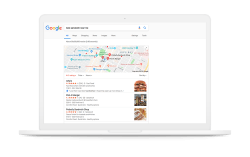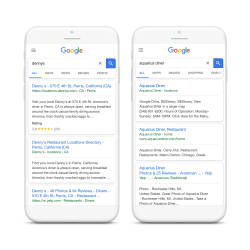Industry Insights
Five Actions You Can Take Today to Give Your Restaurant Brand a Marketing Boost
We are in the midst of a massive shift in the ways people search for restaurants every day. Today, intelligent services are giving consumers direct answers and they’re surfacing more types of information than ever before. A 2017 Yext study revealed: 68% of searches for restaurants today are unbranded — meaning customers are searching by cuisine […]

We are in the midst of a massive shift in the ways people search for restaurants every day. Today, intelligent services are giving consumers direct answers and they're surfacing more types of information than ever before.
A 2017 Yext study revealed:
- 68% of searches for restaurants today are unbranded — meaning customers are searching by cuisine type or food item, not by a restaurant name
- 83% of consumers read a restaurant menu online before dining out
- 76% of diners were more likely to choose a restaurant that provided information about price range, dress code, and meals served in the search results
When a customer searches for a menu item like "pizza" or a highly specific search like "casual restaurant with wifi that's good for kids," will they choose you — or your competition?
Here are five quick strategies that will help your restaurant get chosen by today's hungry searchers.
1. Manage your digital knowledge.
What is digital knowledge? It's all the facts about your restaurant brand (like name, address, phone number, hours of operation, and menus) that live online for customers to search.
Search engines and intelligent services like voice agents, maps, and apps are looking for signals of confidence from businesses. There is no better way to establish that confidence than making sure your digital knowledge is accurate, up to date, and consistent everywhere your brand lives online.
67% of diners consider three or more options before deciding where to eat.* By having your digital knowledge everywhere, you're creating a greater opportunity for these intelligent services to choose your brand when a customer is searching for a restaurant. When a hungry searcher opens up a browser or asks Siri to help them find lunch near them, these services base the results on whichever business most closely matches the relevant search. If your hours of operation on Facebook are different than what's posted on Yelp, you're giving a bad signal to intelligent services and customers. If your competition has control of their digital knowledge, and all their listings are accurate and matching, then there is a higher likelihood that their business will appear in search results that could be relevant for your business.
2. Use influencer marketing.
A study by MuseFind revealed that 92% of buyers trust an influencer more than they would an advertisement. With intense competition, restaurants have to find ways to cut through the noise and attract the eyes of hungry customers.
Working with local influencers who have spent time curating an audience of food fanatics (and diners looking for recommendations) can be a fast, fun, and effective way to connect with potential new customers.
If you're spending money on traditional advertising and marketing, consider testing out a budget for influencer marketing instead. This could be as simple as offering free meals in exchange for posts. Many micro influencers are more than happy to do this. Inviting them to dine with you, take pictures of your food, and share it with their audiences on social media can be a quick hit to get visibility in your local market.
3. Reply to ratings and reviews.
97% of consumers say they've read an online review in the past year. But what's important is how those reviews impact your business: Reviews contain valuable information about what customers like, and don't like, about their experience with your business. Harnessing this knowledge can lead to better reviews in the future and possibly open up ideas for business innovation.
Reviews contain valuable information about what customers like, and don't like, about their experience with your business. Harnessing this knowledge can lead to better reviews in the future and possibly open up ideas for business innovation.
We have a customer here at Yext who noticed an increase in the amount of reviews mentioning "silverware." Those mentions correlated with negative ratings and reviews. Initially they assumed it was about dirty cutlery, and they were about to implement changes to make sure the silverware was clean.
But using Yext's Sentiment Analysis tool, they quickly determined that the problem was not dirty silverware — but actually that the silverware was missing! A much easier problem to solve.
4. Generate first party reviews.
If managing ratings and reviews on third-party sites like Yelp, Facebook, and Google My Business is like having Captain America on your marketing team, then taking advantage of first-party reviews is like having the entire Avengers team powering your search engine results.
First-party reviews live on the website for your business. They are a powerful tool in driving customer advocacy and SEO benefits.Reviews can help with your web traffic and conversion rates. In fact, a one-star improvement can lead to a 5-9% revenue increase(https://www.hbs.edu/faculty/Publication Files/12-016_a7e4a5a2-03f9-490d-b093-8f951238dba2.pdf). If you are generating and publishing reviews to your own website you can see higher click through rates in organic search. Which restaurant would you click on? They might both be great places to get lunch, but you probably noticed that Denny's has 20 reviews, plus a positive rating, while Aquarius Diner has neither. Yext has found that when restaurants have reviews on their website, they can see click through rates on organic search results increase by 153%!*
They might both be great places to get lunch, but you probably noticed that Denny's has 20 reviews, plus a positive rating, while Aquarius Diner has neither. Yext has found that when restaurants have reviews on their website, they can see click through rates on organic search results increase by 153%!*
5. Add Schema markup to your website.
Google, Yahoo, and Bing created a standard vocabulary that webmasters can use to give signals back to the engines to let them know what kind of content is on a web page. That standardized code is known as Schema.org, or simply Schema.
By adding Schema to the back end of your website, you can send a clearer signal to search engines letting them know that your business is actually a restaurant, when you are open, what is on your menu, and where you are located — plus all the other digital knowledge that people care about when searching online about your restaurant.
To add Schema markup to your site, you'll need to do some heavy coding OR use a tool that generates the code for you. As Schema is constantly changing, you'll need to make sure your coding or tool is constantly updated.
Adding that to your restaurant's website, in addition to maintaining your digital knowledge and managing your ratings and reputation will come together to form a clear signal to intelligent services that you are indeed the restaurant that people are searching for!
You can use the Google Structured Data Testing Tool to see if your website already has or needs schema.
* Yext Local Search Behavior Study, July 2017

